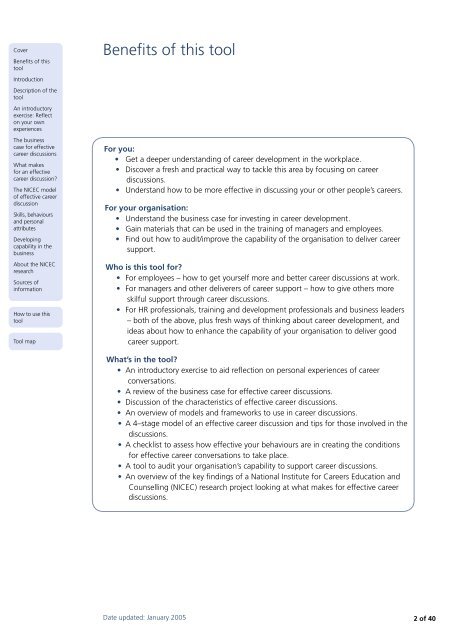Career Discussions at Work, Practical Tips for - CIPD
Career Discussions at Work, Practical Tips for - CIPD
Career Discussions at Work, Practical Tips for - CIPD
You also want an ePaper? Increase the reach of your titles
YUMPU automatically turns print PDFs into web optimized ePapers that Google loves.
Cover<br />
Benefits of this<br />
tool<br />
Introduction<br />
Description of the<br />
tool<br />
An introductory<br />
exercise: Reflect<br />
on your own<br />
experiences<br />
The business<br />
case <strong>for</strong> effective<br />
career discussions<br />
Wh<strong>at</strong> makes<br />
<strong>for</strong> an effective<br />
career discussion<br />
The NICEC model<br />
of effective career<br />
discussion<br />
Skills, behaviours<br />
and personal<br />
<strong>at</strong>tributes<br />
Developing<br />
capability in the<br />
business<br />
About the NICEC<br />
research<br />
Sources of<br />
in<strong>for</strong>m<strong>at</strong>ion<br />
How to use this<br />
tool<br />
Tool map<br />
Benefits of this tool<br />
For you:<br />
• Get a deeper understanding of career development in the workplace.<br />
• Discover a fresh and practical way to tackle this area by focusing on career<br />
discussions.<br />
• Understand how to be more effective in discussing your or other people’s careers.<br />
For your organis<strong>at</strong>ion:<br />
• Understand the business case <strong>for</strong> investing in career development.<br />
• Gain m<strong>at</strong>erials th<strong>at</strong> can be used in the training of managers and employees.<br />
• Find out how to audit/improve the capability of the organis<strong>at</strong>ion to deliver career<br />
support.<br />
Who is this tool <strong>for</strong><br />
• For employees – how to get yourself more and better career discussions <strong>at</strong> work.<br />
• For managers and other deliverers of career support – how to give others more<br />
skilful support through career discussions.<br />
• For HR professionals, training and development professionals and business leaders<br />
– both of the above, plus fresh ways of thinking about career development, and<br />
ideas about how to enhance the capability of your organis<strong>at</strong>ion to deliver good<br />
career support.<br />
Wh<strong>at</strong>’s in the tool<br />
• An introductory exercise to aid reflection on personal experiences of career<br />
convers<strong>at</strong>ions.<br />
• A review of the business case <strong>for</strong> effective career discussions.<br />
• Discussion of the characteristics of effective career discussions.<br />
• An overview of models and frameworks to use in career discussions.<br />
• A 4–stage model of an effective career discussion and tips <strong>for</strong> those involved in the<br />
discussions.<br />
• A checklist to assess how effective your behaviours are in cre<strong>at</strong>ing the conditions<br />
<strong>for</strong> effective career convers<strong>at</strong>ions to take place.<br />
• A tool to audit your organis<strong>at</strong>ion’s capability to support career discussions.<br />
• An overview of the key findings of a N<strong>at</strong>ional Institute <strong>for</strong> <strong>Career</strong>s Educ<strong>at</strong>ion and<br />
Counselling (NICEC) research project looking <strong>at</strong> wh<strong>at</strong> makes <strong>for</strong> effective career<br />
discussions.<br />
D<strong>at</strong>e upd<strong>at</strong>ed: January 2005<br />
2 of 40

















